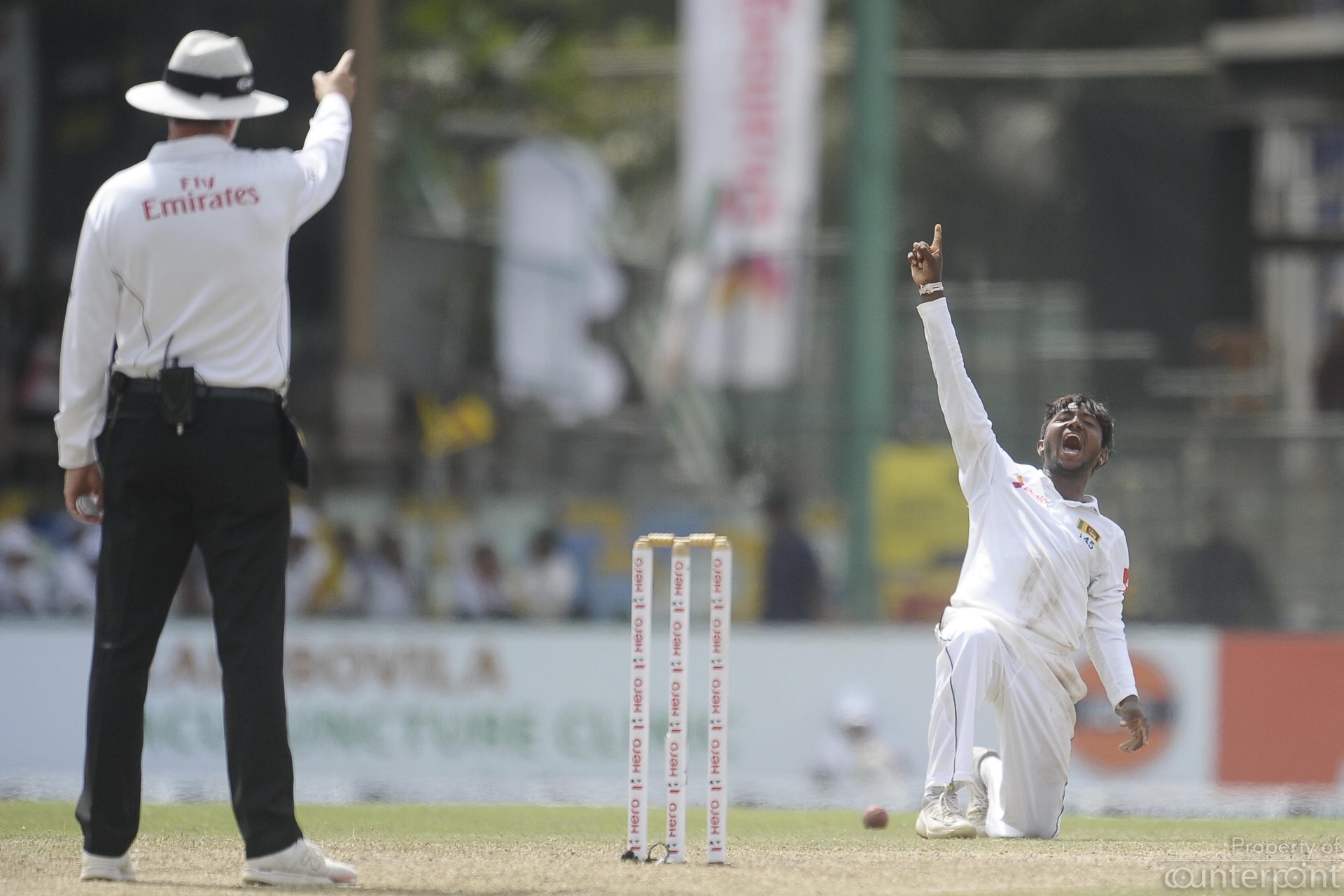
In another David and Goliath tale, the Sri Lankan Cricketers belied their lowly sixth rank to brush aside second ranked South Africa in a 2-0 sweep of their two-test series which concluded this week.
Revelling in home conditions with dry spinning tracks, the Lankans completely outplayed their opponents to extract revenge for the 3-0 drubbing they received when they last toured South Africa. In that series in 2016-17, the hosts South Africa prepared fast, bouncy tracks to expose the Lankans known weakness for fast bowling and recorded three emphatic wins by huge margins.
In the recently concluded series the South African batsmen were found out against quality spin and struggled to cope with the hosts three-pronged spin attack which accounted for 37 out of a total of 40 wickets. The complete dominance that the Lankans had over their opponents would have surprised even the hosts themselves as the Proteas appeared to find hidden terrors in the pitches where there were none at all.
Such was the dominance of the hosts that both games ended with plenty of time to spare. In the first test in Galle the Proteas were dismissed for 126 and 73, their lowest ever score since readmission – lasting just 28.5 overs as the test ended halfway through the third day with the hosts registering a win by a massive 278 runs.
In the next game they were fortunate that the Lankans chose not to enforce the follow-on despite having a lead of 214 runs. And thanks to two rearguard innings from Theunis de Bruyn and Temba Bavuma the visitors put up their best ever batting performance in the last innings of the short series.
After totals of 126, 76, and 124, they scored 290 in the last innings and although they lost the game by 199 runs with over a day to spare, a few of them salvaged some of their reputations.
The last innings of the Proteas also went a long way to dispel the notion that the pitches were doctored to suit the local bowlers and were virtually unplayable after the first two days. Although the hosts won both tosses and batted on the first day in the tests, they also scored runs in their second innings as well on the same pitches which the visitors had struggled on.

It is certainly true that the Lankans had the pitches made to suit their spinners and to exploit the weakness of the South Africans against quality spin but in doing so they were only doing what every other host country does, when playing at home.
Indeed, host countries preparing wickets to suit the strengths of the home team is nothing new and in fact most host countries resort to every tactic possible to give their own teams the best possible chance of winning. Tour itineraries are fixed when the weather is at its most uncomfortable for visiting sides, preliminary tour games meant to give touring sides some vital match practice are often of no value because the sides are filled with fringe players and offer the weakest opposition. The wickets for these games too are usually the opposite of what is being prepared for the opening test.
Traditionally most teams from the subcontinent are bred on spinning tracks and their batsmen are adept at tackling the spinning ball but are often quite poor on fast bouncy tracks and can’t handle the short pitched deliveries that whistle past their ears.
This situation is the reverse for the other teams who are used to fast tracks at home but struggle to cope with quality spin. As a result, the emergence of quality fast bowlers in the subcontinent is as much a rarity as is the discovery of a top class spinner outside of it.
Nevertheless, almost as soon as the first test concluded there was much nonsensical talk about the doctoring of pitches, the need to do away with the toss and the quality of warm up games. Unbelievably, even some of the players were dragged into these debates with more than one South African complaining about the quality of the opposition and the pitch for the warm up game – why complain when they do exactly the same at home?

The South Africans were so preoccupied with all this mumbo jumbo about the wicket that they were sitting ducks when they went out to bat. They treated every ball with mistrust and most often brought about their own dismissals. Both de Bruyn and Bavuma showed them how to go about building an innings and had there been a third game in the series it may well have gone closer.
Of course the South African selectors must take some of the blame too for not picking the best possible team to do battle for them in the ‘spinning minefields’ of Galle and Colombo. De Bruyn should have played at Galle at the expense of the third fast bowler Vernon Philander and for the second test they needed to bite the bullet and drop Dale Steyn and play two fast bowlers – Kagiso Rabada and Ngidi and the two spinners – Keshav Maharaj and Tabraiz Shamsi.
Steyn was only a shadow of himself and appeared to suffer from lack of match fitness. It may be his destiny that he gets dropped for South Africa’s next series and remains level with Shaun Pollock with 421 wickets when he calls time on a great career.
For the hosts, everything seemed to go right and they seemed to have turned the corner with their recent performances. Deprived of their captain, coach and team manager who were all banned by the ICC for the entire series, the team showed it had great character to dig deep into their reserves and come up with some superlative performances.

The turn-around in their fortunes began with the third and final test against the West Indies in June this year when they scraped their way to a hard earned victory to draw the three-test series 1-1 with one draw. The win brought them a unique record – they became the only Asian team to beat West Indies at their stronghold in Barbados.
They were boosted by the return of their two most experienced players – opener Dimuth Karunaratne and former skipper Angelo Mathews – who both missed the West Indies series and Karunaratne turned in a stupendous performance to be the undisputed man-of-the-series whilst Mathews lent solidity to the middle order and was a calming presence on the field.
Stand-in captain Suranga Lakmal proved that he has the Midas touch with his third win in three tests as captain – a unique record. Apart from Karunaratne and Mathews, opener Dhanushka Gunatilaka weighed in with some solid contributions to give his side the ideal start to their innings. The spinners Rangana Herath, Dilruwan Perera, Akila Dhananjaya and Lakshan Sandakhan all put in good efforts and proved that Lanka’s bench strength is also solid.
One area the hosts should be concerned about is the fact that they failed to tackle the spin of Maharaj and allowed him to take nine wickets in an innings in the second test.
The series ended on a sour note when opening batsman Gunatilaka was suspended for an off-field incident just at the time that the batsman was beginning to settle down in the test team and had made some significant contributions to his team’s efforts. Such incidents should not be condoned but one wonders at the swiftness of the action taken by the authorities in this case while they are yet to hold an inquiry into the conduct of their captain Chandimal, Coach Hathurusinghe and Manager Gurusinha who were all banned by the ICC for bringing the game into disrepute.




